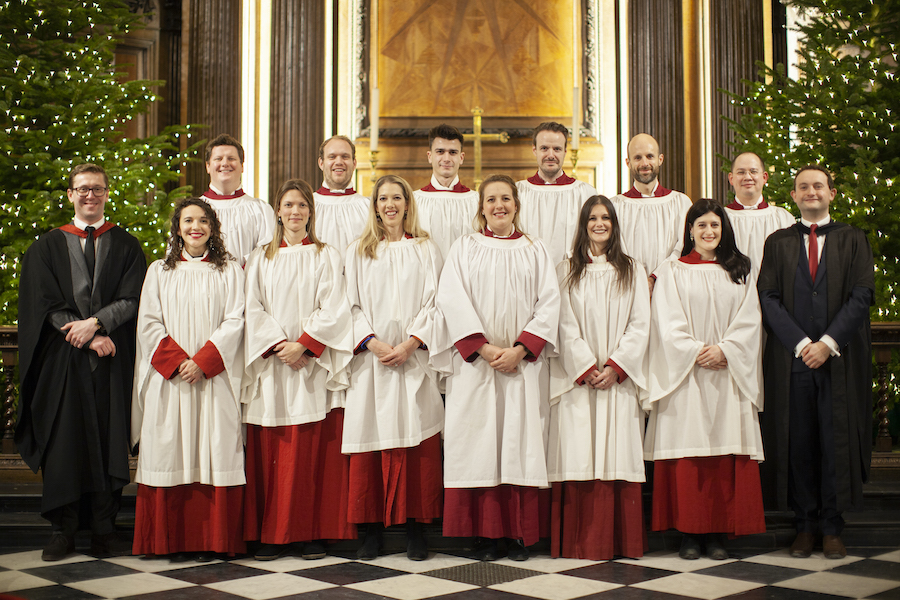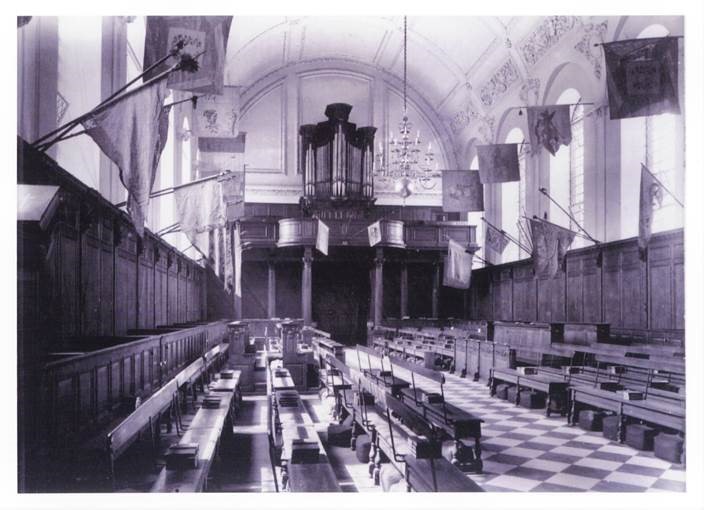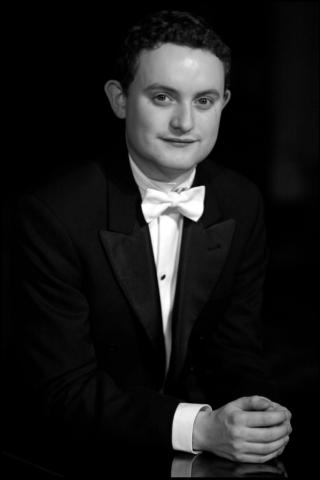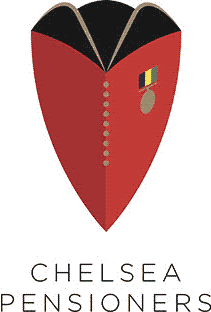The Chapel Choir of the Royal Hospital
“First-class personnel . . . it’s the tension and subtlety in the performances that catch the ear” - Gramophone
The Royal Hospital Chelsea, home of the Chelsea Pensioners, has employed a Chapel Choir since its founding in the late 17th Century. Led by its Organist and Director of Music, William Vann, since 2012, the Chapel Choir’s members regularly perform with many of the world's leading consort groups, such as The English Concert, Stile Antico, The Tallis Scholars, and Monteverdi Choir, and the choir includes members of The Sixteen and the BBC Singers.

The Choir sings Choral Matins in the Wren Chapel at the Royal Hospital Chelsea every Sunday at 11am (a service which is open to the general public), and provides the music at carol services, weddings and other events at RH. The choir, led by William Vann, has made seven recordings since 2016 (another will follow in 2024). Two of these have additionally featured performances by the Chelsea Pensioners themselves: Carols from Chelsea, described as “spotless” by The Guardian, and In Remembrance, which marked the centenary of the WW1 Armistice, both on the SOMM Recordings label.
This choir's regular concerts at the Royal Hospital are always popular sell-outs: it is also available for concerts and other events outside the Royal Hospital. Read a review about their 2013 Concert Series performance.
The Wren Chapel Organ
The original organ (installed in the very early part of the 18th Century) was built by Renatus Harris, and it is his case which still houses the current instrument. The organ was renewed in 1811 by Gray, with the addition of an octave of the then new "German Pedals". By the 1920s it had fallen into disrepair and was replaced with a new extension organ by Compton, who also enlarged the organ case and moved it forwards.

The development of musical standards at the Royal Hospital during the 1970s revealed the limitations of the Compton organ as a serious constraint so, in consultation with the Department of the Environment, Hill, Norman & Beard installed a completely new tracker action organ in 1978, with a specification in the style of a late 19th century Hill instrument. Tonally this proved to be hugely successful, though by 2003 the action had become worn and unreliable.
In 2005, Walkers installed a brand new action and the organ was also thoroughly cleaned and overhauled. There were also a few minor tonal adjustments which included the re-ordering of the mixture stops, relocation of the swell clarion to the pedal and, to take its place, the creation of a very beautiful 4' harmonic flute. Together with the addition of three carefully voiced digital stops on the pedal, the organ has been greatly enhanced, not only for playing repertoire but also for colourful psalm accompaniment and vigorous hymn singing.
Organists
There have been only fifteen organists since the Hospital's foundation in 1692. Of these the most prominent was Dr Charles Burney, holding the post between 1783 and his death in 1814, a period in which Enlightenment ideals had become established throughout Europe. Burney was an accomplished figure in literary and musical circles: his fame rests on his General History of Music, published between 1776 and 1789, which revealed an extraordinary breadth of knowledge, much of which was gained on extensive travels in Europe. He was an accomplished astronomer whose acquaintances included Sir Isaac Newton and William Herschel, the discoverer of Uranus. Burney himself published a pamphlet on the minor comets. He was a friend of Haydn, who stayed in the Organist's apartments at the Royal Hospital during his two major London visits, and it was through Burney's recommendation that Haydn was awarded an honorary Doctorate of Music by the University of Oxford in 1791. Frances (Fanny) Burney, was a celebrated novelist and lived here with her father until her marriage to the French exile, General Alexandre D'Arblay, in 1793.
List of organists of the Royal Hospital Chelsea
1693 Peter Dumas
1719 Theophilus Cole
1730 Barnaby Gunn
1753 Thomas Rawlins
1767 Thomas Wood
1783 Charles Burney
1814 Charles Wesley
1817 Margaret S Robertson
1819 Eustace Danby
1823 Margaret S Robertson
1847 Sarah Revell
1877 Elizabeth Welsh
1895 Beatrice Radcliffe
1935 Helen Young
1974 Ian Curror
2012 William Vann
During the 19th Century the Hospital appears to have adopted the custom of appointing women as organists. This had been prevalent in churches in the City of London during the 18th century, though the post-holders' resignation was always expected (and insisted on) in the event of their marrying. Apart from a short period in the 19th century the Royal Hospital Organists continued to live in the apartments formerly occupied by Burney, their salary being supplemented by official quotas of coal and gas during the late 19th and early 20th century. It was only in 1989 that these quarters were re-allocated.

The current Organist & Director of Music, William Vann, oversees the music in the Wren Chapel, including training the Organ Scholar and Chapel Choir, and takes an active part in the musical life of the Royal Hospital. He also works outside the Royal Hospital as a conductor, harpsichordist, pianist and organist, performing across the U.K. and internationally. Recent performances have included appearances at Royal Festival Hall, Queen Elizabeth Hall, Wigmore Hall, Cadogan Hall, the Royal Opera House, Sage, Gateshead and St John’s, Smith Square, at the Aldeburgh, Edinburgh, Oxford Lieder and Machynlleth Festivals, the Northern Ireland Festival of Voice (broadcast on Radio 3) and abroad in France, Germany (on live ZDF television), Ireland, Nigeria, South Africa (National Arts Festival) and Sweden. His discography includes recordings with Albion, Champs Hill, Chandos, Delphian, Etcetera, Navona and SOMM. He is the founder of the London English Song Festival, an Associate of the RAM, Musical Director of Dulwich Choral Society, a Fellow of the Royal College of Organists, a Trustee of the Ralph Vaughan Williams Society, a Samling Artist, a Freeman of the Worshipful Company of Musicians, the Chairman of Kensington and Chelsea Music Society, the Artistic Director of Bedford Music Club, the Guest Conductor of the English Chamber Choir and a regular conductor and vocal coach at the Dartington and Oxenfoord International Summer Schools.



